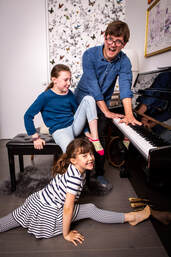 There are countless articles and posts about the benefits of playing an instrument as a kid: research has proven that music education enhances a child's math skills, organizational abilities, self confidence and general intelligence. But the benefits of playing an instrument are not merely developmental. Music benefits adult life as well. Here's how: Learning to play an instrument in adulthood has been associated with improved long term memory, as well as reduced risk of heart disease. Playing an instrument has also been shown to provide a healthy therapeutic outlet that encourages both emotional expression and healing. Adult music education is inherently social, connecting the adult student with both a musical mentor and a large community of listeners and fellow musicians. Researchers agree that social connection is a major factor in keeping our brains healthy. The insight provided by the study of international music, from Bach to Reggae, rap to Native American songscapes, can enrich and expand the adult learner's cultural intelligence, improving cross cultural, as well as cross generational, understanding. Whether taking up an instrument learned as a child, or learning to play for the first time, an adult who plays a musical instrument is always learning, always improving, always challenged with new goals, never bored - a great antidote to mid-life malaise. In other words, the benefits of playing a musical instrument are not just for kids. If you are considering returning to that instrument you once played, or would like to learn an instrument for the first time, here’s how you can get started.  One thing all the good and memorable teachers I've had in my life have in common is that they could made me laugh. From a high school history teacher who threw erasers at sleeping students to a grad professor who could tell you you sound terrible in a way that made you look forward to hearing it. They weren't all Jerry Seinfeld but they had humor in their own way. Some witty, some dry, some sarcastic, some even a bit shocking, but all funny. I remember these teachers more vividly than the rest and I remember their lessons more clearly. Is there a correlation between laughter and learning? I've always said that a laughing student is a happy student and happy students make happy parents. But it seems there's more benefit to laughter than just a happy student. Laughter can have tremendously positive physiological benefits on learning. Laughter activates regions in our brains which release the neurotransmitter dopamine. Dopamine is the major component that regulates desire and motivation, it reinforces pleasure-seeking behavior and greatly influence our happiness. In other words, dopamine makes us feel good and can make students enjoy their lessons more. Dopamine secretion also improve our memory. Studies have shown that when dopamine is present during an event or experience, we will remember it; however, if it is absent, we usually won’t. Dopamine is tied to your reward center, so if you don’t feel interested in specific activities or learning certain subjects, then dopamine levels will decrease in your prefrontal cortex. If this happens, then your brain will not feel the motivation to remember the facts presented to you. So if you make your students laugh, not only do we get happy students and happy parents, a laughing student is learning.  A new study by yougov.com puts some numbers on something we've been doing at WillYouLearn since the beginning. "People who generally play by ear (without reading sheet music) are more likely to say that playing music “does come naturally” to them (56%) than ... by reading sheet music (35%)." You can find the full results of their survey here. All in all it's promising news for the future of music education. Our mission at WYL is to help you "make music your own." We help our students learn to listen and absorb music until playing an instrument becomes as natural as speaking with their own voice. The way to do this is by first developing the ear. In music, your ear is your most indispensable ally. When we're young, our ears tell us if music is good or bad, if a note sounds right or wrong. As we age, our ears evolve to embrace nuanced interests. The ear is the reason a particular harmony can send shivers down our spines, a rhythm prompts foot-tapping, and a melody brings tears. The ear is the passage to our unfiltered musical selves. Parents often ask me if working on ear training goes against learning to read music. The answer is that the two things go hand in hand. In the same way we learn both to speak and to read in a given language, learning to read music requires the ear to translate the notes and symbols on the page into sounds in your head, and then into sounds on your instrument. In the words of Erroll Garner "no one can hear you read." There is a natural order of language learning - listening, imitating, speaking, reading then writing. We believe music is most successfully taught the same way and this is why we begin our youngest students with folk songs. Folk songs contain the phonemes of musical language.
|
AuthorWill Armstrong is the founder of WillYouLearn. He's a professional pianist with over 20 years of teaching experience. Archives
July 2024
|
Follow us on social! |
|
 RSS Feed
RSS Feed
